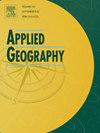建成区环境对抑郁情绪的影响:来自中国的证据
IF 4
2区 地球科学
Q1 GEOGRAPHY
引用次数: 0
摘要
建成区的环境对心理健康有重大影响,但这种影响的程度需要进一步量化。本研究开创性地从宏观角度,利用互联网大数据平台获取2015 - 2021年各城市的连续数据,以地级市为尺度对心理健康问题进行调查。本研究通过GIS分析方法探讨抑郁症的时空分布,通过面板回归分析探讨建成区环境指标对抑郁症的影响。结果表明:①高萧条指数地区主要集中在东部地区和其他地区的部分一线城市;(2)抑郁指数随时间逐渐升高。③地区生产总值(GRP)、普通中等学校在校生人数、第三产业占GRP的比例、国民银行贷款和互联网服务用户数量的影响相对稳定,这些指标的增长导致了萧条指数的上升。基于这些结果,未来的城市发展应采取具体的区域措施来解决人们的心理健康问题,并确保经济发展伴随着对心理健康的关注。本文章由计算机程序翻译,如有差异,请以英文原文为准。
Impact of environment in built-up areas on depressive mood: Evidence from China
The environment in built-up areas has a significant impact on mental health, but the extent of this impact needs to be further quantified. This study is a pioneering article that, from a macro perspective, utilized internet big data platform to obtain continuous data for various cities from 2015 to 2021, and investigated mental health issues at the prefecture-level city scale. This study explored spatiotemporal distribution of depression through GIS analysis methods and impact of environmental indicators in built-up areas on depression through panel regression analysis. The results showed that (1) the areas with a high depression index were mainly concentrated in the eastern region and some first-tier cities in other regions. (2) The depression index increased gradually over time. (3) The effects of gross regional product (GRP), number of students enrolment in regular secondary schools, tertiary industry as percentage to GRP, loans of national banking system, and number of subscribers of Internet services were relatively stable, and the growth of these indicators led to an increase in the depression index. Based on these results, future urban development should adopt region-specific measures to address people's mental health issues and ensure that economic development is accompanied by a focus on mental well-being.
求助全文
通过发布文献求助,成功后即可免费获取论文全文。
去求助
来源期刊

Applied Geography
GEOGRAPHY-
CiteScore
8.00
自引率
2.00%
发文量
134
期刊介绍:
Applied Geography is a journal devoted to the publication of research which utilizes geographic approaches (human, physical, nature-society and GIScience) to resolve human problems that have a spatial dimension. These problems may be related to the assessment, management and allocation of the world physical and/or human resources. The underlying rationale of the journal is that only through a clear understanding of the relevant societal, physical, and coupled natural-humans systems can we resolve such problems. Papers are invited on any theme involving the application of geographical theory and methodology in the resolution of human problems.
 求助内容:
求助内容: 应助结果提醒方式:
应助结果提醒方式:


